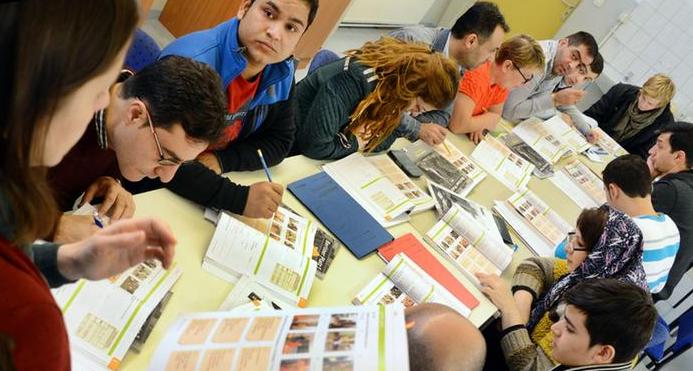(Editor’s note: This is Part 3 of Laura Kaye’s series detailing how tp make the most of, the German integration course, which includes an intensive German-language course. You can read Pt. 1 here and Pt. 2 here.)
I arrived for the first day of my VHS intensive German course not really knowing what to expect. My first impression of the class was that it was a little like being back in high school. Most of the class hadn’t arrived by the time the lesson began at 9 a.m., and there were repeat reminders from the teacher to pay attention and put mobile phones down.
Before the lesson began, two of the younger students were reminded they were not allowed to sit together. They protested but eventually took their seats at opposite sides of the room. Another student strolled in 30 minutes late and placed a chocolate bar on the teacher’s desk. “Entschuldigung,” he apologised with a guilty smirk. The chocolate apparently some kind of penalty for arriving late.
The teacher shouted something at him in German, which I later translated as “I’d prefer you to arrive on time so that I wouldn’t get so fat”. The class laughed, and the chocolate was passed around.
“What on earth have I gotten myself into?” I thought.
‘We’re all in this together’
Despite the less than ideal picture initially painted here, I will say that my experience with the course was ultimately very positive.
The classes are taught entirely in German, which means that you are immersed in the language from day one. There was a good mix of grammar, reading, writing, listening and speaking. The course moved at a fast but manageable pace, and classes were engaging.
I had two main teachers, as well as the occasional substitute, all of whom were highly experienced and very competent. Of course, the success of any course depends upon how you get along with the teaching style, and I will say that I definitely preferred one teacher to the other. Sometimes it’s the luck of the draw!
 As you might expect of a subsidised course, VHS class sizes are pretty large. Throughout my course, there were 20-plus students registered at any time. Despite there being so many students in the class, there was always opportunities for everyone to participate, and I didn’t at any point feel that I would have benefitted from a smaller class size.
As you might expect of a subsidised course, VHS class sizes are pretty large. Throughout my course, there were 20-plus students registered at any time. Despite there being so many students in the class, there was always opportunities for everyone to participate, and I didn’t at any point feel that I would have benefitted from a smaller class size.
We were all encouraged to speak in class – to introduce ourselves and speak about our interests and opinions, to read texts out loud, to take turns answering grammar questions – and I found that I actually learned better by having the opportunity to listen to so many different people speak.
The students in the class were a very varied mix of nationalities and ages, and had arrived in Germany under different circumstances: au pairs, university students, refugees, trailing expat spouses.
Although students came and went throughout the different levels of the course, there was always a friendly atmosphere amongst the class, and a sense that we were all in this together. It’s impossible to spend so many months taking an intensive language course without making friends along the way.
The topics covered in the course were helpful for anyone trying to set up life in Germany: shopping, getting around town, finding work, health, family life etc. This being Germany of course, the topic of the recycling naturally came up multiple times. I also ended up with an unusually broad vocabulary on the topic of collecting wild mushrooms. Wie nützlich!
Useful information:
- Each level of the course runs for 100 hours. Your course length will depend upon how many hours you are in class per week.
- Pay attention to public and school holidays as your school might be closed.
- You will need to buy course books and stationery for your course. Your teacher will give you a list of what to buy during your first class.
- Homework was given every day and took usually about 20-to-30 minutes per day.
- Attendance is recorded for those taking the classes as part of the integration course, and absences must be accounted for (especially if the course is a requirement of your visa or unemployment allowance). Periods of sickness longer than 3 days require a doctor’s note. This does not apply to private students.
- Longer absences for holidays can sometimes be granted at the teacher’s discretion. In my experience, they were fairly relaxed about this so long as students were able to catch up.
- Once you are enrolled on the course, you will likely be given the opportunity to continue to the next level without having to re-register. Though you will still need to pay for the next level in person at the Kasse during its opening hours.
Towards the end of level B1.2 we began to prepare for sitting exams.
The integration course prepares students to sit the Deutsch-Test für Zuwanderer (DTZ). This exam is provided free to anyone registered on an integration course, and students studying with the VHS can register for the DTZ exam at their school office.
Due to limited exam slots, I was lucky enough to take my exam at 8:30 in the morning. On the other side of the city from where I live. On a Saturday. On my Birthday. But at least that gave me a good talking point for my mündliche Prüfung (speaking exam). Apparently early Saturday morning exams are fairly common, however according to my teacher, 8:30 in the morning doesn’t qualify as early in Germany.
I still had so much to learn!
The exam is split into three sections. Listening and reading, a writing exercise, and a speaking exam. For most people, the speaking exam is the most daunting part of the exam, however in the end I found it to be far less traumatising than I’d imagined. A piece of advice here: You will take the speaking exam with another candidate, and will be given your time slot after finishing the written part of the exam. I recommend finding the other candidate with the same time slot as yourself so that you can practice together whilst you wait. I credit my better-than-expected score to this bit of advice.
Helpful hints for those taking the DTZ exam:
- Candidates must register for their exam at least six weeks in advance. However, keep in mind that places can fill up several weeks before the registration deadline. Reserve your place as early as possible!
- There are guides you can buy to help you prepare for the exam, such as this one available on Amazon. You can find further information to help you prepare for the exam on the website of the relevant examining body. Students in our school sat exams provided by TELC.
- You can find examples of B1 level speaking exams on YouTube (above.)
- Remember to take pencils, an eraser, your ID, and your proof of registration for the exam. Any other belongings you have with you will be placed at the back of the exam room or in lockers.
- Don’t forget to turn off your phone. If it rings from your bag during the exam, you can be disqualified.
- It’s also advisable to take water to have with you during the exam, and something to eat whilst you wait to take your speaking exam, since you may be there for up to several hours
- If you don’t pass with enough points to qualify for the B1 certificate, you may at least qualify for an A2 certificate. You can usually apply to retake courses (at the same subsidised rate) and resit exams at no additional cost. If you fail your exam first time ‘round, remember that you’re not the only one. Many of the people sitting my exam were sitting it for the second time
And that was that! 5 weeks later my B1 certificate arrived in my Briefkasten, and I was ready to take my orientation course. 100 hours of instruction on the German political system, history, society and culture.
This was going to be fun!…right?
 About the author:
About the author:
Laura Kaye is a freelance writer, researcher and editor. Her work focuses on social and development issues, parenting and family life.
Originally from the Wirral in the United Kingdom, she is a serial expat now happily living in Berlin, Germany.
More posts by Laura Kaye
Dear undecideds: Are you really willing to live with the reality of a no-deal Brexit?
Berlin’s struggling Kita educators are underpaid and overwhelmed
Broken Kita system leaves parents frustrated, stressed
Everyone loses – employers, families and kids – as Kitaplatz waiting lists grow in Berlin
Having a baby in Berlin: Medicine, rather than modesty, is the aim of the game in Germany
Having a baby in Berlin, Pt. 2: Learning German whilst pregnant so we’re not ‘those expats’
Having a baby in Berlin, Pt. 3: A Berliner is born, and the German benefits you need to know about
Laura Kaye is a freelance writer, researcher and editor. Her work focuses on social and development issues, parenting and family life.
Originally from the Wirral in the United Kingdom, she is a serial expat now happily living in Berlin, Germany.






























